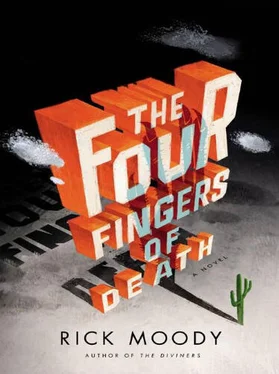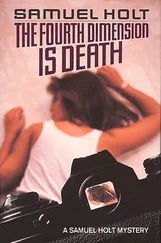Koo said, agitated at the reminder, “This is information that is useful to remember, yes. But in the meantime, I do need my son, who has a blood type match with his mother, to consider whether he might be willing to offer up some tissue for experiment, and it doesn’t need to be very much, just a little bit, really.”
“How much?”
“It could be something very small. Perhaps a toe. Or a finger. A pinkie.”
… Night fell over the desert and Monaco 37 streaked past again and the stars were like the future perfect of an uncommon verb. Or the stars were the filaments of discarded human aspirations. Or the stars in the night sky were the innumerable preschoolers of September, afraid to climb onto the bus in order to have their liberty abridged. Or the stars in the night sky were like so many holes into which our heads were to be stuck. Or the stars in the night sky were the innumerable computations of some frail and overburdened supercomputer, come to the logical end of its computations. Or the stars in the night sky were the total sum of responsibilities, grievances, loves, of a certain nation listing to the end of empire. Or the stars in the night sky were an example of every possible color in the spectrum of all colors, but the beauty of this spectrum was so overwhelming that an unaided eye could no longer discern it. Or the stars in the night sky were the number of words required to correctly describe the stars as a whole. Or the stars in the night sky represented the number of times that a certain recalcitrant boy was reminded to observe the natural world around him. Or the stars in the night sky were ghosts of all the dead, known and unknown to this boy and others. Or the stars in the night sky were pocket lighters flicked on during the encore of the stadium rock show, back when there were still pocket lighters. Or the stars in the night sky were a painterly representation of the idea of insignificance. Or the stars in the night sky were the manifest eruption of something from nothing. Or the stars hinted at a conflagration happening on the other side of a wall of dark substances, through which these tiny holes had been poked. Or the stars in the night sky were a soup of possibility, a broth of what might have been and what might come to pass. The stars in the night sky were a grinding down of all the mineralia of planet Earth into infinitesimal grains, which grains were in turn bits of gas and debris cast off by the stars themselves. The stars in the night sky indicated the natural end of our twenty-four-hour day, and that was why they were greeted with such astonishment and relief — the turning away of the sun was both relief and impertinence. The stars in the night sky were the light show for the desert itself, a ratification of its disuse. The stars in the night sky could only be appreciated in silence. The stars in the night sky could only be experienced in motionlessness. The stars in the night sky had a cumulative effect, and the longer you looked at them, the more you wanted to, as if the stars were somehow addictive. The stars in the night sky were addictive, and when used improperly they crowded out other activities, particularly social activities, unless these social activities were organized around the night sky itself. The stars in the night sky cohered with certain harmonic principles, cycles per second, but they did not accord with musical principles that affirmed tonality, but, rather, a more random sequence of assonances and dissonances of such long duration that most human beings would perceive the musical principles of the stars in the sky as having a dull, endless sameness, a dissonant mercilessness. The stars in the night sky were prolix, show-offy, because they meant to make a mockery of mathematical ideas of infinity, just by being here. They were finite but limitless. The stars in the night sky had to be seen in the desert, and eventually the desert lured out all stargazers, even people who were busy with many other things, special education, identity theft, the making of low-budget pornography films, day-trading in Central Asian markets; they all found that when they saw the stars in the desert, they put aside childish things, and thus, in the desert there was the Very Large Array, and then the Very Very Very Large Array, and then there was the International Sonoran Array, which was so large that you had to fly from one end of the field of radio dishes to the other to bear witness to the entirety of the stargazing apparatus of the desert; whole cities sprang up inside the International Sonoran Array; it had its complex of universities and think tanks, mostly now concentrated on the other side of the border, since that was where the venture capital was located, where there was less fallout from the emigration problem. People came to the desert because the stars were in the desert, and the stars had yet to be corrupted by man, though man had managed to corrupt so much else, and there was no fee involved. In fact, the stars, it seemed, would crush man in a scenic, gravitational panorama before man would ever corrupt the stars, and that was why man mostly neglected them, or attempted to surpass the stars, gauzing over the night sky with his sugary glaze, in the pursuit of making the night sky less seductive and more like the screen of a monitor switched to the off position.
The omnium gatherum , because of its interest in the primeval, staked a claim to the night sky. Here in the desert. People went over the mountain pass to the great emptiness beyond, west of Rio Blanco, and they abandoned their cars and their bikes by the national forest, which was no kind of forest at all, but just a long stretch of saguaros and cholla. And they walked a mile or two into the Valley of the Slaughtered Calf for the night sky, and for the particular entertainment of that night, which was the Apotheosis of the Arm . Volunteers had roped off a portion of the valley, and the Bureau of Land Management, which was protective of local mining claims, became suddenly , on this night in the beginning of the cooler part of autumn, with the stars spilling into the sky, all but absent. They waived a number of permits. Unaccountably. There was a police cruiser or two at the front entrance of the Valley of the Slaughtered Calf, but no one could tell whether there was an officer of the peace resting within the cars or not, and so the disaffected streamed past, the disaffected, the forgotten, the homeless, the religious zealots, the disabled (in their motorized wheelchairs), the conspiracy theorists, the abused, the ambulatory masses who were hardly so huddled, they came to the Valley of the Slaughtered Calf because they believed that something unforeseen might take place here, or because, at the very least, they believed that they could dope themselves here, which was revolution for its own sake, and in doping themselves they wouldn’t have to reconsider and revisit their misfortunes any longer. The fighter jets had lifted off at the air force base, and the sky had fallen into a certain portentous silence. The partygoers were wearing festive garb, when they were wearing garb, although it was mostly just the OxyPlus addicts from the local fraternities (those who had not yet failed) who willingly came naked, or in loincloths, wearing headbands and sunglasses but otherwise with their nether parts dangling in the penumbra, flailing as they began to dance, not even recognizing the not-at-all-tribal metronomic battery of dead girlfriend as it pummeled the public-address system, admixed with the recordings of the calls of the last remaining humpback whales, sounds of slot machines from the nearby reservation casinos, high-tension lines amplified. Their nakedness was dazzling to themselves, and what women were present would long for these fraternity men, at least in the masculine imagination this was the case, the imagination of those who didn’t end up falling asleep or vomiting and passing out.
Читать дальше












